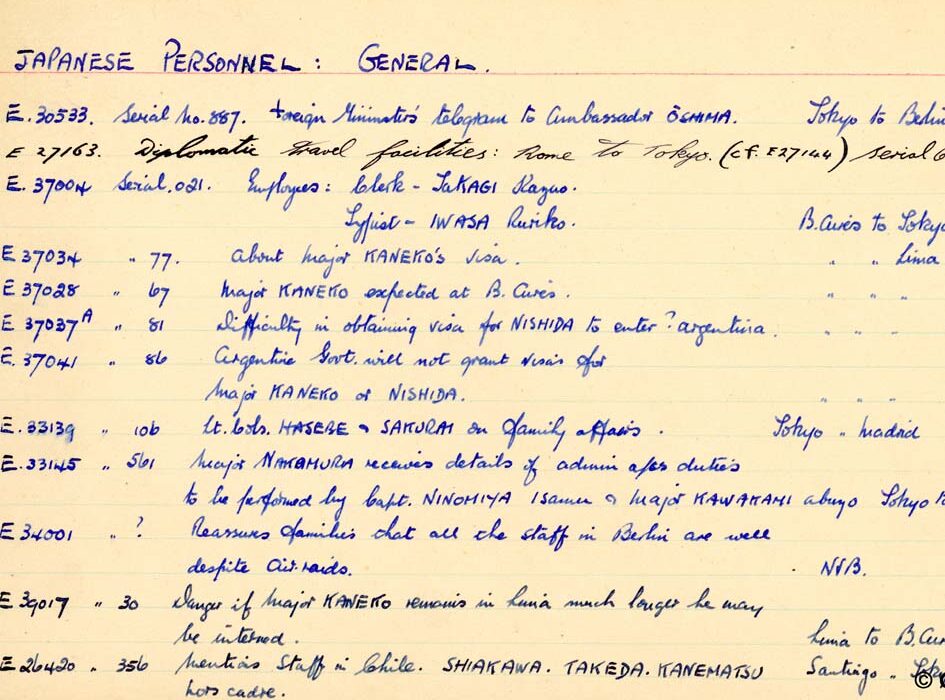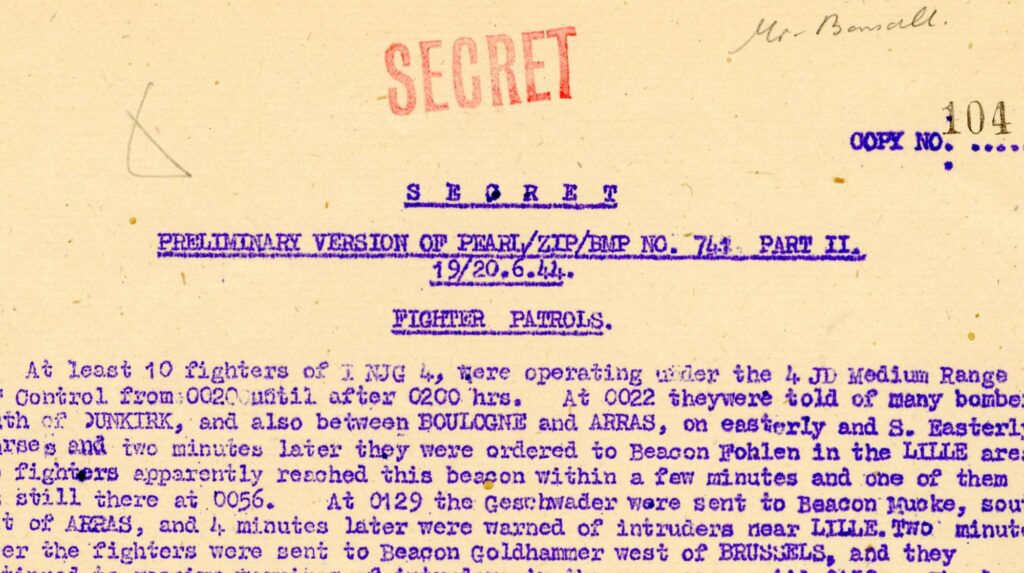Field Marshal Gerd von Rundstedt was appointed German commander-in-chief in the West from March 1942. Here, Bletchley Park records his visit to inspect German defences along the French coast in April 1942. Known as the Atlantic Wall, this extensive system of fortifications and defences was erected from 1942 to 1944, in anticipation of an Allied invasion of occupied Europe.
XbTlngpeUZkpL3OVPHcyQke7oyhmbbEh2dLQmDRENXBFj6T5WvLRcuzPzWKsAcWVBDEcS0jROKaqEIRvQ6eVLokBBKFGAOBHKLmp9
r17vezEuQIn59wGRY8RXXXF0wQNAT9rvIbznZZ7D0jdv9AmVle46YAMlyYdD061s1n5MfZ5oYy7vWfA0SXrn0bXlSNy7j2zTHMkG6
b1zVTfB4dyxtCxPGlQZhcd0xFOWz8SOVP3F7upj2O7TAcYfkgoehYLNcSd4UvJAP7C2PjNL6ELILe0uBjITIOw2NpgWAii8Qcx2wT
hJSomSW0IUDA2qAUaoFeCZu0gDjOkhRUUgWCUnXN8PCDsQEofX9ZA6a5M3DCrWNFQyT0xRjnf7IdQ0dzTaqLbbujo2LtQZTWZxt3o
w1rX5Myfdv768YpwX7n2l61XZ5sAliWoJ7zNyNU7d4t1ELjVTupIAOmEbpVgAdEVSAuWxFwrF704aSvCWbrltrKjfgam5Kp7oSaqk
YUaIHw64TDN5JhBwIq4CBSWfd1cRunRGm61CQQEQW9HeTppCX5dslotVlXuxcA11oC6CKoFyejknvN8tpBa7ana86Bn42NTlgQXcs
NyICzGcpPdWpIUWQf21Hp8v88genJGVU3DPT8YGFwf15gK0MKO7OVLqvYrLjczW1bPVcDYyfVzXMziNlQkGuWdcQzTukJs1UL0OZ8
PGTlCnXBlYRg0eHKrWQ81KMMXd2TUYeLy254q3huohlqOfgEC4ANCKnTv4HVHiC7DT4Hbphenu72yL8KX6gLdGVmKSQJEux6m3k0T
8pxcZbqEF7tuA0L8vqqgm2fpLuSQIcbtM3QdUqJ0sJ3nhhEkYgOoD2EFJuuiwMfBgiNdAZY4UXc48MZW0DVNMOtGEC76HoWiDOgML
Aae22cLUVvMVb93gQd6deYnTdYO7ViEH8wjvCtU3RQpcIa9CchYBhZ4ztFdTVDUSre6s51nkA7SiiTzAcyLlljV2ixRGraRR5PHMf
2k2wSqhowKbij31mOh33Fe5M135CCWu6uGJUprciYHb5yYT34AMls0LU23grG5MdiQbuGiAmeDjnpHjuutQetX5QkHsFmLOMDFtpm
DdT2P8QjaAf9jO2MruSA4QPTcDJPuan7aKYdJtdnxHgiap3FzQDkRNPYByqNHpwi2pqqw1oXQYa0igzQMBWzbMWZOKM4wdZ3FVLnc
PqQuJbMoq0KUFnYSXjRI9po4AjNwfyctmAiCAWWLi8k6OIuT8QlBjgmveJ5UaPwahLj16kKdVcmwioBzq5734JObRwY7vNzPKbXN4
rcf3WaUoXWghvl68iPcXtqdQsZTG2r2Uddzi07iiamhKv69IQnh4WhAoNrCAYoNTf8b7e2dE3XVhmBeLgFzypjPgLsEkU9twwCGql
tCk9Rxos1Gl24XmXzUtMZIiG7XZz1w5EmHMk9nwblGxy97obbt1Y5ZCTtOLOXeiVlFZeIP1cr2KAmtiFVSDmtjhvMqWyYGoR1w9E4
ErRszvzeHqERiyi32flCMHA77R5QOJOR1X64sx9OQOAqPmeAkUz5kqGE1Bp9aHDgpnbM0apEMRy1zehVoCZJNI5vOeB8fXHTHS4bE
XWD0YHoW3os9zOQYfbJBUKUqewm9gpHFdsPj87VCGH6BKJ5ZR14DAIUFLEXN2TQPWTE3dhleuofWTg72UpgqrmiA4AOC99vxhHHZA
aEXV4lHyhW9ODsvGe6fXFbuHdG8ufHFbJhbsVkWAaypANoKIdCa8pt0RD2vImkpmJkm1JBmtUCGe1yyvL4LARWUP15RfpntUp07WU
xiT7VXtaiYFrPG5GexbusRd1Nn49moTieJ1ZFmEDCxg4KCRipggXTwnsSFgZwIdNet3wlZZwsLYhABwG3wuKclhNRtIzsMiCBcTPm
a0Fq0tVpjnQS4XkiNAfxXUGENHFQPtTf7qty5JddtV8Nqay85L17qt0TnF0bmEv8geK09ySCPRo2gE9otdWhHATUMiiYNHNtJLAiE
2CYGwv8gVkxsZV6dWGfrgx9j0vMK6CjGryozpAXrorB8lmT0goMALy1u2LaPomowv3iiS2IhWrmrieKSg5fmEcSOsNhLVrlrQAfEN
Kyywpg6qmdJKELUA4O6RDaXyusnddrIkh4hv1JXbTT9mK20iYccA8FRt7yWX2KJrBASBK86VMRVUW88bKKSyIDkzvuv9rl3LptGke
rylWHrZ7wYUNqLOW8UtcvAjS2dkX0O9eZvXTRM5ONe4hlfycON60vIxOjULUHqKSDW75j8C0W4y9ffOBgIkC5tebAYTDLbqNGp1pz
qPRPYg6em7DpDkHPIxfEQJSfoKjX7HtKnXIb7zuDMOJHjw6oyWCGrmOxaTvaHxorcY4PyqYcbB3QN5MjQoWlRsMDN5CI3dcfCrWcE
FTAEjzVEwiMOaRiiPquXeqSwjQ3vy5WHmMuP0dRr0QZKU4AR0yDE3je1IK54HmYnigNIMsCyUAl8xlQ8LtTQpMkUAje8kygEFAKwi
Xxc5nek4eYafP0zGkbmCzTsVuD3VHdArFjrJLNYVKgnfLW2ckZwGiaoy4S6NhWw33wRVgnmgEiiKFtiefCS4AImriUme6PbUiDjFm
XboxngpeUZkpL3OVPHcyQke7oyhmbbEh2dLQmDRENXBFj6T5WvLRcuzPzWKscWVBDEcS0jROKaqEIRvQ6eVLAokBBKFGAOBHKLmp9
ErPIisLYgRJ8IR2u7QOMxGNi6k6hs9tOWth3OM6TC0rOTQfvpz6IIzVTXBEQomQl1kWVcPwTqv2gdmTa6dC9x2PaS4qmqS5txyXer
SnYSsxGG6oebPBiGg5X0tMEsypWRYNu7bxfBvixZfRpFCBKnHSwtYb0vecLKHnvCC1OJsUOy5Skrf5XDzVYMdcCMxBhOxsv3iB5jR
XWD0YHoW3os9zOQYfbJBUKUqewm9gpHFdsPjibNYXDtFnO59Mur84fTkoy0IiYCdTE3dhleuofWTg72UpgqrmiAL4AOC99vxhHHZA
QOlal5GQaui90qp0Xm63jXnKGXbnDaeVuWh6SeNbh6Z52AL8wRmNrLKV9hlUYrPNK8QEmYDUciLoTkill6CPCbvtE5zdlRo1iQPS9
r17vezEuQIn59wGRY8RXXXF0wQNAT9rvIbznZZ7D0jdv9AmVle46YAMlyYdD01s1n5MfZ5oYy7vWfA0SXrn0bXlSNAy7j2zTHMkG6
1zVTfB4dyxtCxPGlQZhcd0xFOWz8SOVP3F7upj2O7TAcYfkgoehYLNcSd4UvJP7C2PjNL6ELILe0uBjITIOw2NpgWAWii8Qcx2wTA
Tracking Axis personnel
In World War Two, surveillance of enemy communications provided essential material for BP’s Codebreakers and crucial intelligence for the Allies. Once messages had been decrypted and translated at Bletchley Park, the information they contained was meticulously recorded onto index cards. This vast index of data enabled intelligence to be generated on all levels of enemy activity – not just military plans and operations, but also information about individuals. These cards are from an index of Japanese diplomatic messages compiled by the Japanese Military Intelligence Section in Block F. They contain records of senior Japanese and German personnel. Even personal details, such as an officer’s poor health or a family wedding, could provide valuable intelligence on where the enemy was and what they were planning.
This album was first published on 10 July 2020.
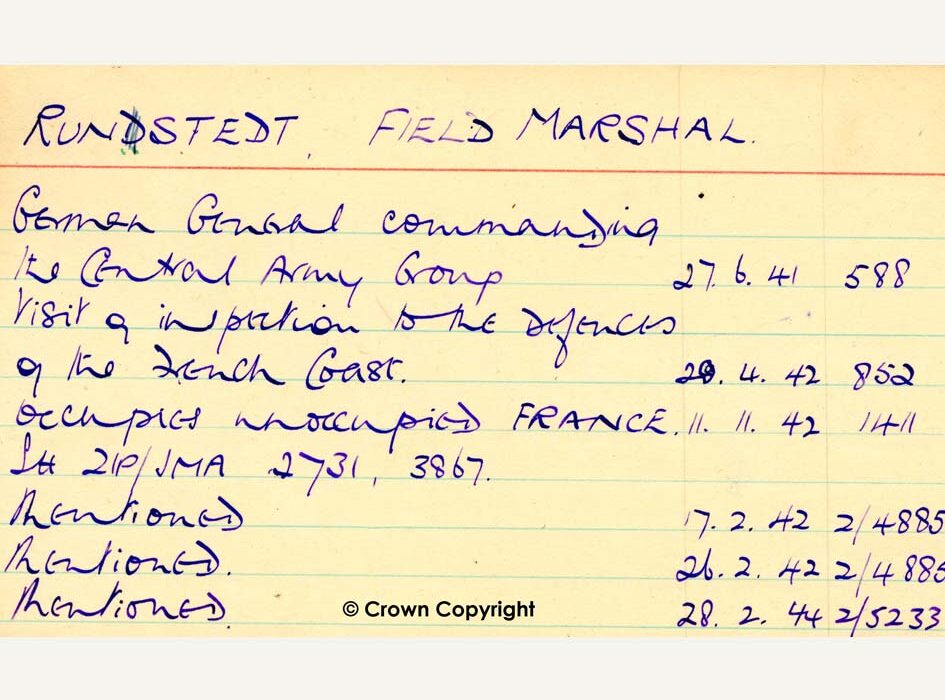
The reverse of von Rundstedt’s index card reports his dismissal after the Allies’ successful D-Day invasion on 6 June 1944 and the German defeat in Normandy. Also noted is his succession by General Günther von Kluge, although these messages are not recorded in date order. The first rumour of the succession, intercepted on 4 July 1944, was only added to the index card after intelligence from messages later in July had confirmed von Rundstedt’s dismissal and replacement.

In 1942, General (later Field Marshal) Erwin Rommel was commander of the new Deutsches Afrika Korps in North Africa. His card records the Axis capture of Tobruk, a strategically significant port city on Libya’s eastern Mediterranean coast, near the border with Egypt. Taken by the Allies in January 1941, Tobruk was defended successfully through an 8-month siege later that year. It finally fell to Axis forces after a second attack in June 1942.
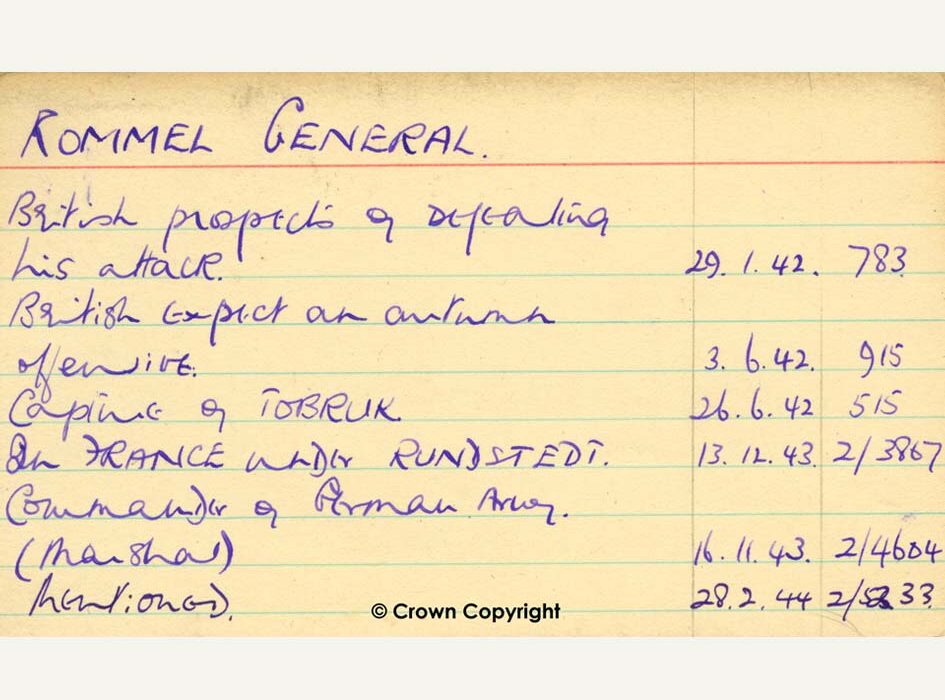
Later entries on Rommel’s card refer to his posting to France from November 1943, under the command of Field Marshal von Rundstedt. The bottom four lines record the famous incident when Rommel was severely wounded after his staff car was strafed by an Allied fighter plane on 17 July 1944, near Sainte-Foy-de-Montgommery in Normandy. Rommel was hospitalised, but is recorded here as recuperating on the outskirts of Paris by the end of that month.

The Japanese diplomatic index lists not only mentions of military personnel in intercepted Japanese diplomatic messages, but also key civilians. Professor Baeker is noted as studying penicillin at the Robert Koch Research Station. Based in Berlin, the Robert Koch Institute conducted research into infectious diseases that could threaten military striking power.
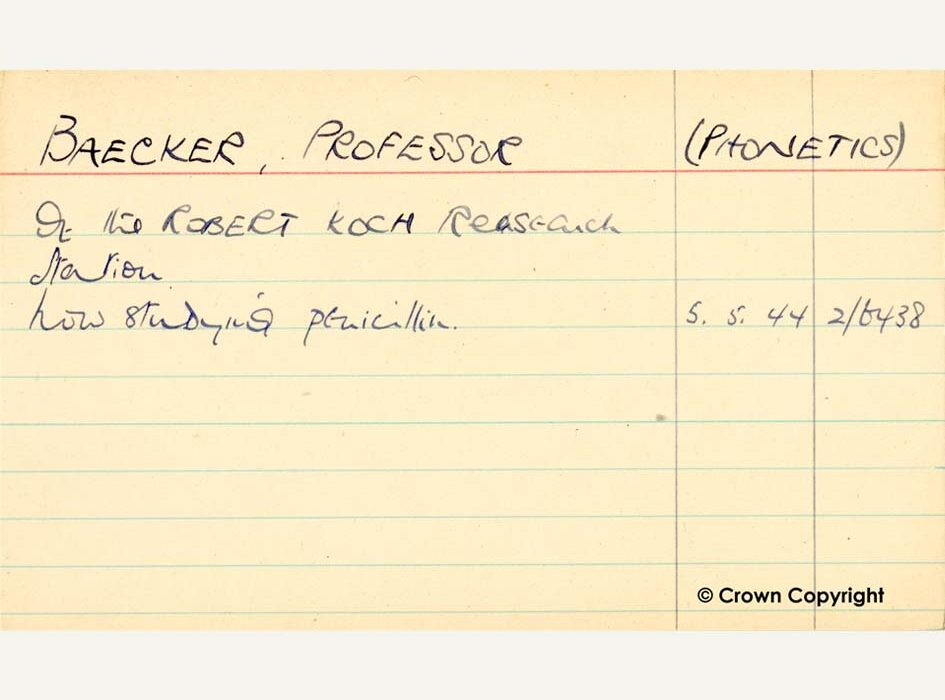
Japanese personnel were frequently mentioned in their diplomatic traffic, which covered not only military matters but also individuals’ personal circumstances. Major Saburo Kato’s card tracks his health in 1944. Hospitalised in Turkey with a temperature of 100.4 degrees, he is then recorded as convalescing. Several months later, a signal from Tokyo requests a report on his condition.

Yoshisada Shizuno’s card notes his promotion from mechanic to engineer, and that he was paid a remittance of 2200 yen while working in Rome in January 1943. Further cards record his attendance at a technical conference in Berlin, postings in France and Italy, and his marriage on 10 July 1944.
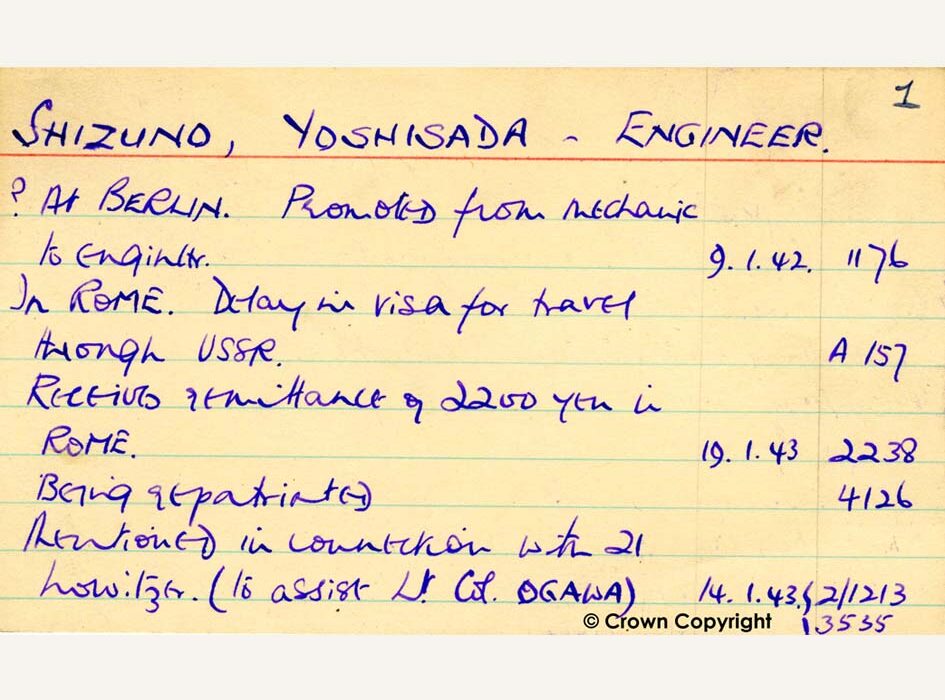
General Oshima was the Japanese Ambassador to Berlin. His reports on high-level meetings with German command, including Hitler, were the Allies’ “main basis of information regarding Hitler’s intentions in Europe”, according to General George Marshall, Chief of Staff of the US Army. This card records talks with von Ribbentrop, Germany’s Foreign Minister, on the prospect of the Second Front – an Allied invasion of German-occupied Western Europe that had been proposed by Stalin in 1942 in order to relieve pressure from German forces on Russia’s western front.
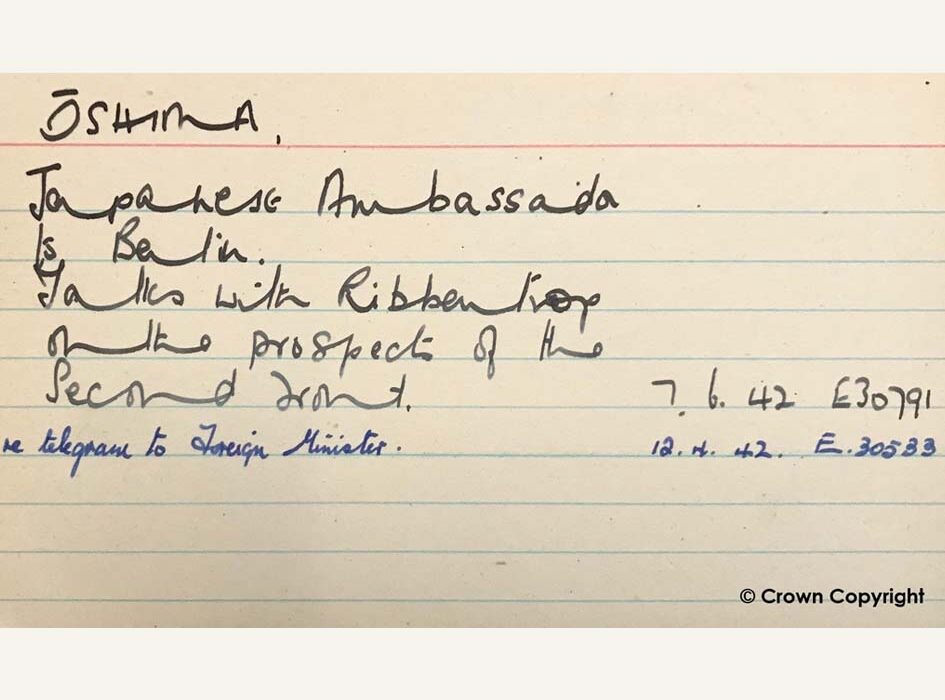
Other cards in the Japanese diplomatic message index collate information about many different individuals. Messages listed here refer to German personnel and range from the award of several decorations to new appointments and postings, anti-typhus research work, and another set of talks between the Japanese and von Ribbentrop.
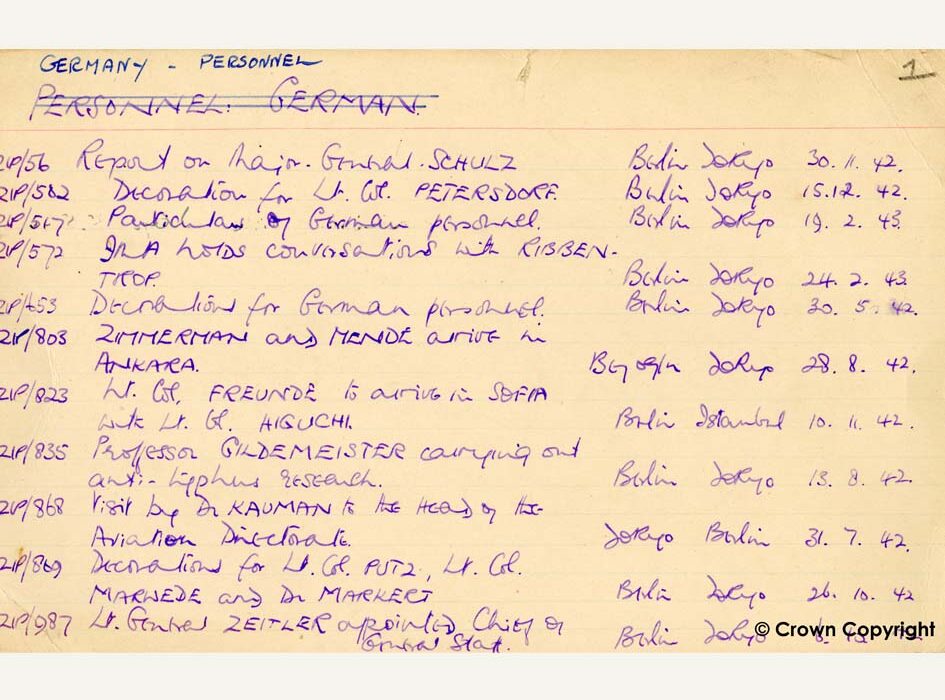
Similar compilations exist for Japanese personnel. Many entries on this card refer to the complexities of international travel in wartime. The Argentinian Government are recorded as refusing visas for two Japanese officers, Majors Kaneko and Nishida. Later that year, a warning is sent that if Major Kaneko remains much longer in Lima he is in danger of being interred.
